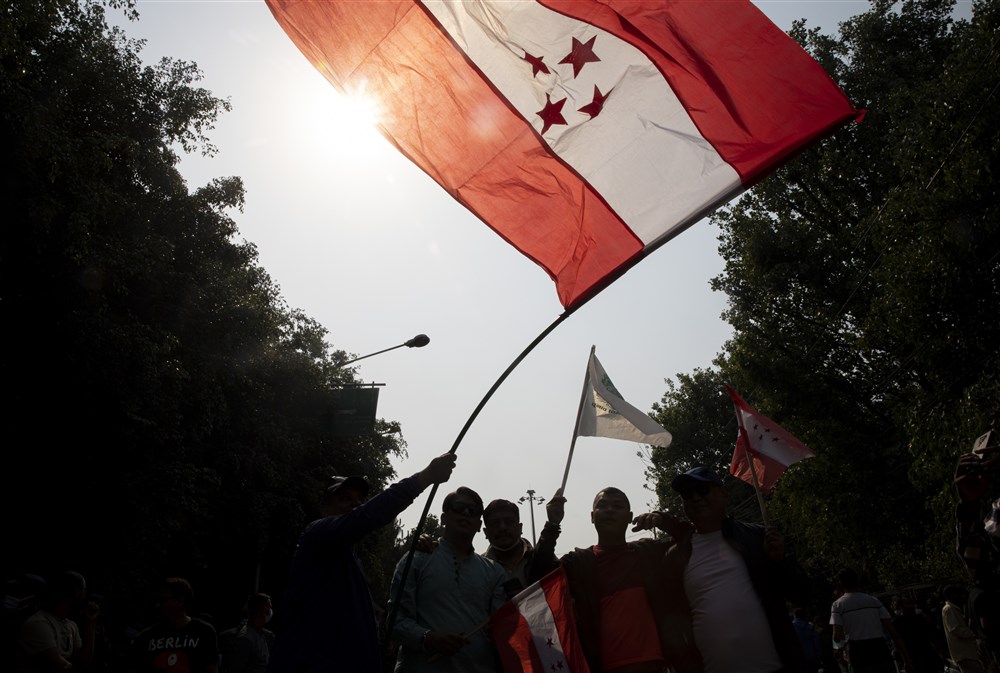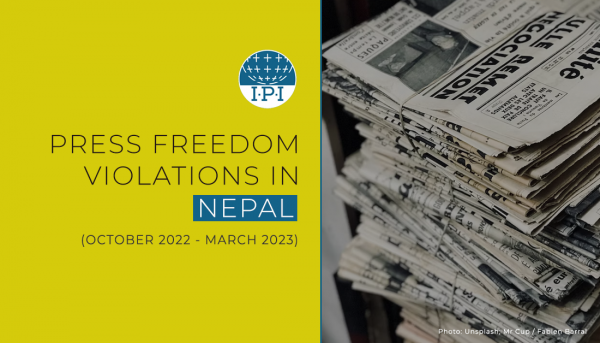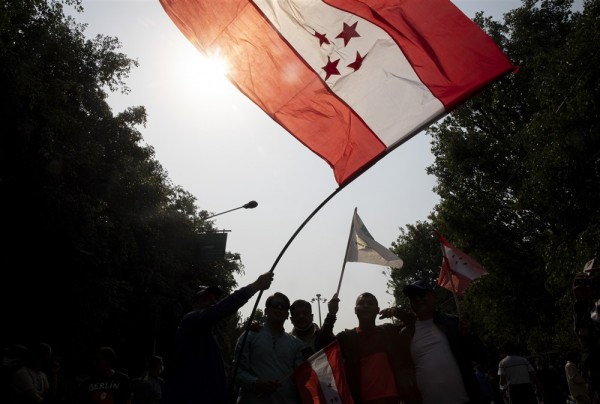The IPI global network today published an open letter to Prime Minister Pushpa Kamal Dahal urging his government to take immediate and concrete action to protect and respect press freedom and ensure that the citizens of Nepal public can exercise their fundamental right to receive diverse, independent news and information.
The letter highlights some of the key challenges journalists in Nepal face in being able to carry out their work freely and safely, based on more than a year of close monitoring by IPI as part of our ongoing work to support press freedom and independent journalism in the country and across South Asia. It also includes a series of concrete recommendations for improving the environment for press freedom in Nepal and for ensuring the public has access to diverse, independent news and information.
The letter can be read in full below or downloaded here.
—
31 May 2023
Dear Rt. Hon’ble Mr. Pushpa Kamal Dahal, Prime Minister of Nepal,
As the global network of editors and journalists dedicated to promoting media freedom and independent journalism, the International Press Institute (IPI) is concerned about the state of press freedom in Nepal.
We call on your government to take immediate and concrete action to strengthen protections for independent media and ensure the citizens of Nepal can exercise their fundamental right to receive and share diverse, independent news and information.
The ability of journalists to report on matters of public interest is essential to free, open, and democratic societies. Governments are responsible under international law for ensuring that journalists can work freely and safely and for guaranteeing the free flow of information and ideas.
IPI has been closely monitoring the environment for press freedom in Nepal, as we seek to support independent journalism in the country and across South Asia. Our monitoring over the past year shows that journalists are often subjected to physical attacks, judicial harassment, state censorship, and arrests.
IPI has documented at least 71 press freedom threats or violations over the past year, which includes both legal and physical attacks against journalists. Our monitoring also shows that a majority of these incidents and violations were committed by state authorities, which include law enforcement and judicial authorities, precisely the public officials and institutions that are responsible for safeguarding fundamental human rights and the rule of law.
We highlight:
- The weaponization of law to punish and target critical journalists. This includes the use of the Electronic Transaction Act to silence journalists in Nepal who publish “improper” news on online sites and social media. In November 2022, a photojournalist in Udayapur was arrested and charged under the Electronic Transaction Act for a story he published online about the elections. In addition, Nepal’s criminal code contains a number of broadly-worded rules related to defamation and privacy that criminalize journalistic work and could undermine Nepal’s hard-fought democratic gains.
- An alarming increase in media censorship by state agencies. Ahead of the federal elections in December 2022, the Press Council Nepal and the Election Commission of Nepal issued multiple notices to independent news outlets to delete content critical of government officials or election candidates.
- Physical and verbal attacks against journalists, often with impunity. In the past year, IPI has documented at least 43 documented cases of physical, verbal, or online attacks against journalists, and in multiple cases, journalists were assaulted in retaliation for publishing news on local government officials ahead of the federal elections in December 2022. We also documented at least 4 cases of journalists who received death threats after publishing critical reports.
Freedom of the press and access to information are formally guaranteed by Nepal’s 2015 Constitution and Nepal’s Right to Information Act, respectively. However, in practice, these guarantees are being weakened by threats and attacks on journalists, as well as by additional laws and provisions in the criminal code that directly threaten the exercise of these rights.
We emphasize that under international law states have a positive obligation to protect the fundamental rights to freedom of expression and information, which includes the right of journalists to work freely, safely, and independently. Any interference with the right to freedom of expression should be prescribed by law and must be necessary, legitimate, and for a narrowly defined purpose.
Moreover, under international law and other agreements, states must investigate attacks on journalists promptly, thoroughly, and independently, and prosecute those responsible. Our work and research have shown that failure by states to investigate such crimes often leads to increased violence.
We therefore call on your government to:
- Cease “lawfare” against the press. The government should immediately cease its abuse of the law to punish and harass journalists and independent media in Nepal. The weaponization of law to target journalists undermines domestic and international protections for press freedom and threatens the foundations of international human rights principles and frameworks.
- Uphold domestic protections for press freedom and independent journalism, as guaranteed by the Constitution of Nepal 2015.
- Conduct transparent and thorough human rights risk assessments on any new and existing legislation that may affect press freedom, in consultation with domestic and international stakeholders to ensure alignment with domestic and international laws protecting press freedom. The government must ensure that all policies and practices affecting the media align with domestic and international human rights and freedom of expression principles and standards, and do not violate or restrict the Nepali public’s right to diverse, independent information.
- Repeal domestic legislation that contravenes domestic and international protections for freedom of expression and the right to information. This should include repealing criminal defamation provisions from the criminal code, and provisions in the Electronic Transaction Act that can be used to silence journalists, in particular Section 47.
- Commit to protecting journalists’ safety and ensure all crimes against journalists and media workers are investigated transparently and independently, in line with international obligations and standards. The government should also take concrete steps to improve accountability for all reported cases of violence or intimidation of the press and human rights defenders, including by establishing clear and transparent procedures and mechanisms for investigating all reported attacks.
- Strengthen the independence and legitimacy of democratic institutions, including the Press Council Nepal and the Election Commission of Nepal. The Press Council Nepal should be restructured as an independent self-regulatory body. The Election Commission should ensure that the press can report on all election-related activities, including on results of exit polls.
The need for quality, public-interest journalism in Nepal and around the world has never been greater. IPI stands ready to discuss our concerns and our recommendations for strengthening media freedom in Nepal and for ensuring that independent journalism can fulfill its critical public function of helping foster democratic, informed, and equitable societies.



